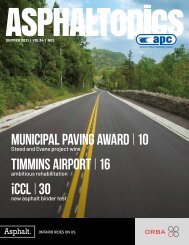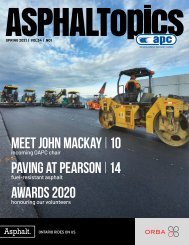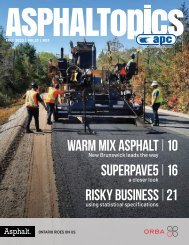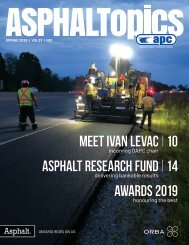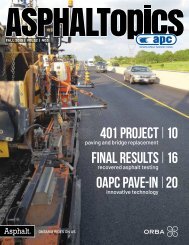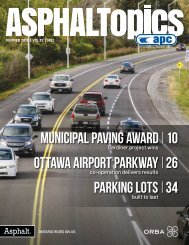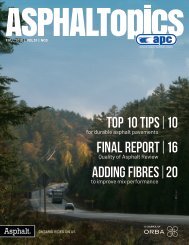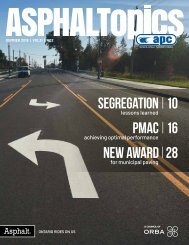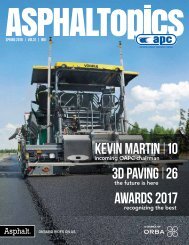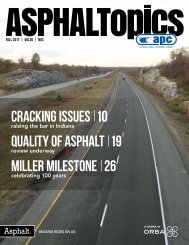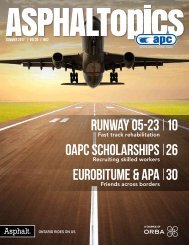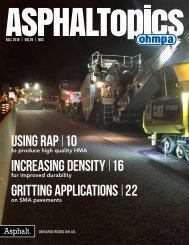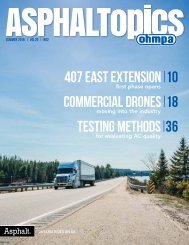ASPHALTopics | Summer 2014 | VOL 27 | NO3
Create successful ePaper yourself
Turn your PDF publications into a flip-book with our unique Google optimized e-Paper software.
The MSCR test uses the creep and recovery testing<br />
method and is carried out in the Dynamic Shear<br />
Rheometer (DSR), which is the same equipment used<br />
for the existing PG specification. Unlike the PG system,<br />
however, the MSCR test measures higher levels of stress<br />
and strain through 10 cycles of creep/recovery. The test<br />
better represents what occurs in actual pavements, and<br />
captures both the stiffening effects and the delayed<br />
elastic effects of the polymer.<br />
To accommodate heavy traffic, the MSCR method<br />
tests binders at the environmental temperature that<br />
the pavement is expected to experience, and requires<br />
higher stiffness unlike the current high temperature grade<br />
bumping PG practice. Because polymers soften at high<br />
temperatures, the results can be misleading. Under the<br />
MSCR grading, the specification values for standard,<br />
heavy, very heavy or extreme traffic are changed, and<br />
the temperature remains the same at 58°C or 52°C for<br />
Ontario. The test identifies the rut resistance of both<br />
modified and non-modified binders, and verifies the<br />
presence of a polymer and the characteristics of the<br />
polymer in the binder. As such, it is no longer necessary<br />
to run additional tests, such as elastic recovery, toughness<br />
and tenacity, and/or force ductility to ascertain polymer<br />
modification of asphalt binders.<br />
“We produced several materials that had a lot of different<br />
properties, and then tested them in the lab,” D’Angelo<br />
says. “We then added them to aggregate mixtures to<br />
validate that the properties were<br />
evident in the mix. The material was<br />
applied on multiple test sections to<br />
test the asphalt binders in real road<br />
conditions, and to make sure that the<br />
results correlated back to the binder<br />
testing. The biggest challenge was<br />
identifying the true properties of the<br />
material. We found that the mixture<br />
test was not capturing the same<br />
properties as the binder test, which<br />
required further testing. You need<br />
to duplicate the results in order to<br />
validate your findings.”<br />
At the FHWA’s Accelerated Loading<br />
Facility (ALF), test sections were<br />
constructed using unmodified, airblown,<br />
SBS-modified, crumb rubbermodified<br />
and Elvaloy-modified binders.<br />
The rutting of the high temperature parameters for both<br />
PG and MSCR were compared after heating the sections<br />
to 64°C and trafficking the sections with a super-single<br />
tire loaded to 10,000 lb (4,535 kg). The study showed<br />
that the MSCR parameter did a better job correlating with<br />
rutting and could identify the rutting performance of both<br />
the modified and non-modified binders. Further testing<br />
on test sections on I-55 in Mississippi confirmed a better<br />
correlation between the MSCR parameter and rutting,<br />
when compared to the PG parameter.<br />
“MSCR testing gets you a better<br />
product in the end,” D’Angelo says.<br />
“In the U.S., there are approximately<br />
10 to 12 state highway agencies that<br />
are making the test standard. Some<br />
have used it for two to three years and<br />
others are just starting. I expect that<br />
MSCR testing will roll out and become<br />
more mainstream next year.”<br />
ENBRIDGE GAS DISTRIBUTION INC. has a more than 165-year history and is<br />
Canada’s largest natural gas distribution company. Enbridge Gas Distribution delivers<br />
safe, reliable natural gas in more than 100 communities across Ontario and is a leader<br />
in delivering energy efficiency programs. Our free services are available to drive<br />
energy-related solutions that can help you save money and improve your bottom line.<br />
We also offer financial incentives that can help reduce your cost of implementation.<br />
Call 1-888-4<strong>27</strong>-8888 to find out how you can reduce your energy consumption.<br />
FIND OUT MORE<br />
enbridgegas.com/industrial<br />
30 OHMPA | ASPHALTOPICS<br />
In Ontario, the Ministry of<br />
Transportation (MTO) has specified<br />
the MSCR test to be performed on<br />
all MTO contracts since 2011. The<br />
acceptance criteria for the MSCR<br />
in these contracts was only for<br />
standard traffic, and MTO still uses<br />
high temperature grade bump-ups<br />
based on the traffic levels on a given<br />
highway. MSCR has not yet been<br />
used on any MTO contracts in place<br />
of high temperature bump-ups for




